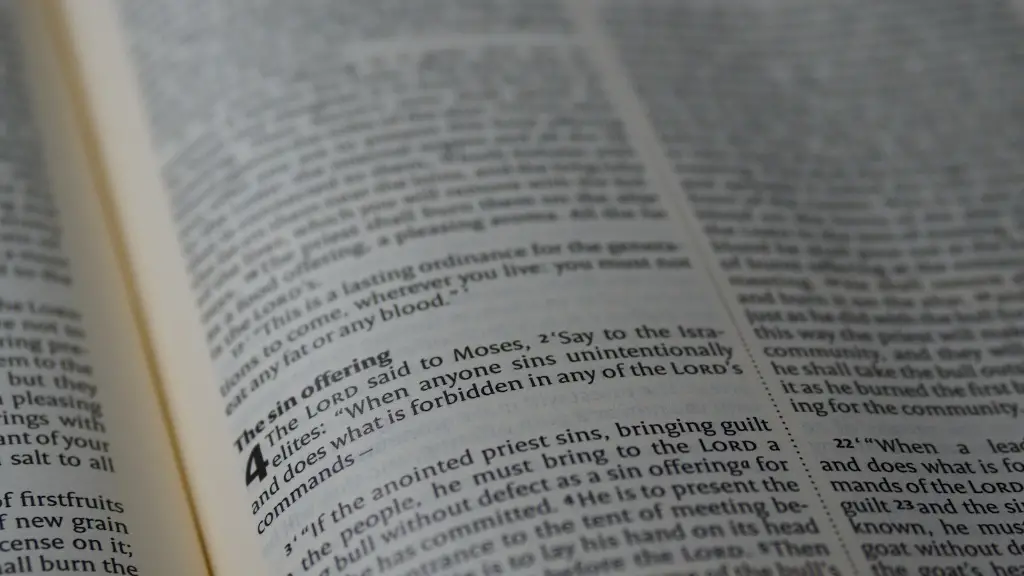Background of King David
King David is a figure from the Bible who is greatly admired and praised by many. He is traditionally known as the second king of Israel, succeeding King Saul and ruling around 1000-961 BC. He is well known for his military successes, political astuteness, and spiritual pursuits. According to biblical accounts, David was a warrior who conquered Jerusalem, consolidated the kingdom in Israel, and helped bring great wealth and prosperity to the region. He is also renowned for his wisdom and divine kingship, which was safeguarded by his love for justice and righteousness.
One of the most obvious attributes that made David the great leader he was said to be was his strength in battle; he was proficient in using the sword and sling, and was a successful military general. His ability to lead the Israelites in war and conquer many cities was an essential part of the legacy he left behind. He also had a great political acumen, which was integral to his rule. David was able to stay in tune with the wants and needs of his people, and was able to use this knowledge to make decisions that would ultimately benefit the kingdom.
Characteristics of King David
Another characteristic that distinguished David from his contemporaries was his faith and piety. It was said that he was committed to following God’s laws, and that God rewarded him for his efforts. He was also credited with writing many of the Psalms in the Bible, which are said to be inspired by his personal prayer and spiritual journey. Some experts even say that his faith was so strong that he was able to successfully resist the temptations of sin.
His spiritual leadership was also credited with bringing prosperity and peace to the kingdom. He is credited with reforming the kingdom’s administration and legal system, establishing cities, fortifying trading posts, and consolidating the wealth of the country. He was a wise ruler and a strong believer in justice and righteousness, and it is said that he always did the right thing, even if it may not always have seemed so to his contemporaries.
Influence of King David
King David’s influence has been felt throughout history, and he has inspired many artists, writers, and religious leaders. His courage and faith have served as an example for countless believers and leaders over the centuries. In the Muslim, Christianity and Jewish faiths, King David is seen as an important prophet and leader. He is revered for his wisdom and piety and for being an exemplary example of a righteous ruler.
In addition to the spiritual legacy that David has left behind, he has also left an indelible mark on Jewish culture. He is seen as a symbol of courage and of faithfulness to God, and his name and legacy are invoked in many traditional Hebrew prayers. David’s legacy and the accounts of his life have been a source of inspiration to people all over the world, and his story has been told and retold in classical literature, art, and in religious texts.
Relevance of King David in Modern Times
King David’s influence and legacy are still felt today. Many see him as an example of faith and courage, and some believe that David’s legacy is relevant in modern times. He is an iconic figure of courage and faith who, despite the odds, was able to lead and establish a successful, prosperous kingdom. He is often cited as an example of righteous leadership, and his unwavering faith and courage have been an inspiration to many.
In the modern world, David’s legacy can be seen in the many places where faith remains a cornerstone of life. He is also restated in Jewish culture, as his name is mentioned many times in traditional prayers. His story is also immortalized in works of art, literature, and religious texts and is often invoked to invoke courage, faith, and righteousness .
Theology of King David
At the heart of King David’s legacy is his theology, his profound faith in God. He is seen as a faithful king who was blessed by God and whose example and leadership showed that integrity, faith and righteousness are possible. Many see him as a symbol of courage and strength, and of a leader who stands firm in his faith. It was this faith that helped him conquer enemies and establish a prosperous kingdom. It was also his faith that helped him reform the kingdom’s administration and legal system, which further solidified his legacy as a just and wise ruler.
Significance of King David
Despite the passage of time, King David’s legacy lives on. He is an iconic figure of courage, faith and righteousness, and his indelible mark on history has had a lasting impact. His example of integrity and leadership have served as an inspiration to people from all walks of life, in all ages and in all countries. His legacy demonstrates that with courage and faith, it is possible to defy the odds and make a lasting difference.
Legacy of King David
Today, King David’s legacy continues to inspire and influence many people. His name is invoked by many who are striving to lead with courage, faith and righteousness. He is seen as an example of how it is possible to remain steadfast in the face of difficulty and ultimately triumph over adversity. His legacy also serves to remind people of the importance of justice and righteousness, and of the power of faith.
Monuments to Honor King David
The legacy of King David has been passed down over the centuries, and there are many monuments that have been erected in his honor in various parts of the world. These monuments serve to remind people of his greatness and the example he set for all those who believe in justice and righteousness. Among the most famous monuments dedicated to him are the Tomb of David in Jerusalem, which is believed to be his burial place, and the Monument of David, which is a massive bronze statue that stands in Sydney, Australia.
Fictional Representations of King David
King David has inspired many artists and writers, and his legacy has been immortalized in many works of art, music, and literature. In the Bible, he is portrayed as a pious and courageous king who followed God’s laws and led his kingdom to success and prosperity. Outside the Bible, he has been the subject of many poems, novels, plays, and films. He is also a main character in many works of classical literature, such as Dante’s Divine Comedy, Shakespeare’s Macbeth, and Milton’s Paradise Lost.



